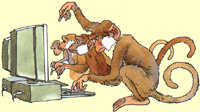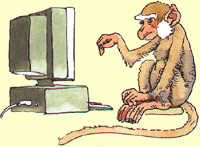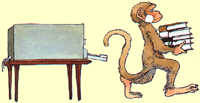 |
 |
 |
First
Team: Making Words Whenever a monkey accidentally types a sequence of letters that the computer recognizes as a valid word, it is saved. "Roses" is acceptable. "Rosgbz" is not. Saved words accumulate over time. |
 |
Second Team: Making Sentences Words generated by team 1 are coded and put into the computers of team 2. When the monkeys strike the keys, the words are strung together in random sequences. The computer saves only those sequences with subjects and predicates - i.e., sentences. "Roses are red" is acceptable. "Roses salad bleakly" is not. |
 |
Third
Team: Making Sonnets Sentences generateed by team 2 are coded into the computers of team 3. These monkeys randomly order the sentences. Only fourteen-line sequences conforming to the sonnet form are saved. |
 |
Fourth
Team: Publishing Sonnet Collections Monkeys in team 4 randomly collect team 3's sonnets into groups, which are printed into bound books. Most sonnets would be nonsense, but a few would be coherent. A tiny fraction of a large enough sample might even be beautiful. |
 |
Books
Are Offered To The Public Only those books that sell out are reprinted. Thus, the worst poetry is "selected out." The best is kept. Eventually, given enough time, a good collection of sonnets will emerge. |
| Could a roomful of monkeys randomly pecking at their typewriters eventually write a Shakespearean sonnet? This question has been used to challenge the idea that life arose by chance. The odds that a hundred monkeys typing away for a million years could accidentally produce such a work of art are vanishingly small. But if we impose some rules of evolution on the process, we can see how nature increases the chance of success - indeed, how it makes success inevitable. First, let's stipulate that the monkeys type out not Shakespeare's actual sonnets, but original sonnets of comparable complexity. That is, we won't demand a specific outcome - just a general pattern. Let's have the monkeys work with word processors programmed to keep successful results and throw out everything else. This rule is the evolutionary principle of selection. Let's arrange for the work to proceed in progressive stages of increasing complexity - another characteristic of evolution. By combinating random typing with cumulative "capturing" of successful results, monkeys can write beautiful poetry! |
 |
 |